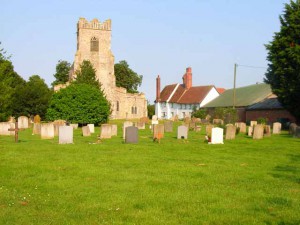
As I delve further into the Winthrop Papers, I am finding interesting asides about the relationships within the Winthrop family. Like his father, Governor John1 Winthrop (1588–1649) remained close to his “brothers” and “sisters,” such as Thomas Fones (d. 1629), the widower of Winthrop’s sister Anne, and Thomas’ second wife, Priscilla (Burgess) (Sherman) (Fones) Paynter, the future governor’s “verye louinge sister Mrs. Fones.”
The long-standing intimacy between the Winthrop and Fones families was deepening in the late 1620s, as Mrs. Fones’ daughter Ursula Sherman became engaged to Forth Winthrop (1609–1630) and, more worryingly, the flirtation of Henry2 Winthrop (1608–1630) and his first cousin Elizabeth Fones lurched toward consummation and marriage. Thomas Fones was in the last weeks of his life when he wrote John Winthrop on 2 April 1629, apologizing that “I could not write last week being so lame I could not feed my self with any hand nor stir out of my chamber…”
His story was a familiar one. He was “overhelmed with trobles and afflictions on all sydes and Increased exceedingly by those from whom I have deserved better… [The] Issue and the requitall of my kindness [is that] your sonne hath wooed and wonne my daughter Besse for a wife and they both pretend to have proceeded so far that there is no recalling of yt at least promise of Mariage and all without my knowledg or consent what grief this is to me I leaue yt to your consideracion [the marriage] being no fit mach for ether of them.”
Fones added a postscript to this cri de coeur: “I cannot write yow the many trobles of my mind what to do for my Nephew says plainly yf he cannot have my good will to have my daughter he will have her without… I am weak and I cannot see now [how I] be the master in myne owne howse and tis hard medling between the barke and the tree for yf he were not so neare allied to me and the sonne of him whom I so respect I could hardly beare such braving oppositions in mine owne howse…” (Volume 2, pp. 78–79)
Ten days later it was over. Fones’ will, noting that he had “already by acts executed in my life disposed of the greater part of my personal estate to and among my children and to the use and benefit of my wife,” passed the problem of “Besse” and Martha Fones – both of whom later married sons of the governor – “unto my said loving brother John Wynthropp until they shall be married or attain their full age of one and twenty years.” (Ibid., pp. 82, 83) He died a day after executing the will (on 15 April 1629), four days before his mother-in-law Anne (Browne) Winthrop, and ten days before the marriage of Henry Winthrop and Elizabeth Fones. (Elizabeth would later be the subject of Anya Seton’s 1958 novel The Winthrop Woman.)
John Winthrop seems to have been less troubled by the situation. In a fond letter to his wife, Margaret (Tyndal) Winthrop, he suggested that “how it is with us, these bearers can informe thee so as I may write the lesse: [Henry and Elizabeth] were married on Saturday last… All our freindes heere salute thee, salute thou ours from me. Farewell my good wife, I kisse and loue thee with the kindest affection and rest Thy faithful husbande Jo: Winthrop
“Let John Bluet be satisfied for his horse.” (Ibid., pp. 84, 85)
Elizabeth was my 16th great grandmother. What fun to read more about her.
I love these stories that show people haven’t changed over the centuries. Our concerns for our children are ever the same.
More great writing on THE WINTHROPS,Mr. Steward! Truly wonderful! I am very proud to be a Winthrop from this family.
When I started out on this continuing journey to find my ancestors, I had no idea what I would find. I didn’t expect to find much past some 2nd or 3rd great-grandparents. Much to my surprise, I found many distinguished and well known ancestors who left their mark on the history of this country. There were three who signed the Declaration of Independence, two who were governors of CT., one who held all four top govt. positions, one a president of Harvard. And while those men left their mark, the ancestor I am most proud of is Elizabeth Fones Winthrop Feakes Hallet. She stood for what was right when it came to her dower lands, most of what is now Greenwich, CT., a very elite residential area. She was an amazing woman for her time and even now should be mentioned when it comes to women’s rights and what she faced during her life. I find it disappointing that she is not mentioned when history is being taught to our children and grandchildren. Too often, children of today, take for granted what they have, without realizing things were very difficult and extremely different even 100 years ago, not to mention 400 years ago in the MA Bay Colony. Thanks to Anya Seton and her meticulous research, I’d never have know what Elizabeth accomplished. Until reading The Winthrop Woman, she was just another female ancestor.